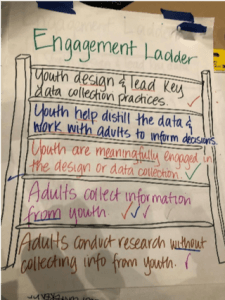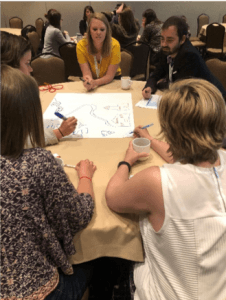The annual Shared Risk and Protective Factors Conference draws young people and adults across Colorado who are engaged in creating connected communities and safe, healthy, and successful youth. Over the course of two days, in beautiful Keystone, CO, participants enjoyed an action-packed series of sessions and inspiring speakers on topics such as youth engagement, partnerships, and data and evaluation. Finding our passion at the intersection of all three of these areas, ResultsLab team members found energy and inspiration in learning with others, especially the young people. Through a ResultsLab-led session and through participating in sessions with others, we reflected on a question that sits at our core: how do we make evaluation meaningful and empowering for young people?
WHAT’S THE CHALLENGE WITH ENGAGING YOUTH IN EVALUATION?
In her keynote, Nita Mosby Tyler shared a powerful message on power and privilege. Historically, evaluation as a field has tightly preserved positions of privilege in the pursuit of ‘rigor.’ However, in reality, this quest for rigor is often in direct conflict with how our young people need to engage and express themselves, especially those who have experienced significant trauma.
WHAT OUR WORKSHOP ATTENDEES TAUGHT US
We hosted a session to disrupt conventional thinking and to spark ideas for activating youth voice in program planning and evaluation. Nonprofit and government agency attendees reflected on their level of youth participation in planning and evaluation, and we learned that many were starting low on the youth engagement ladder: collecting information from young people but doing very little to engage them in a meaningful or relevant way. In fact, many reflected that the lengthy surveys required by funders are in some cases harmful to their young people.
All attendees expressed a desire to update their approach to youth engagement in program planning and evaluation. The group was energized and determined to generate greater youth ownership in data collection and use, including optimizing data collection tools alongside their youth, and even asking youth to take the lead on the data collection and analysis.
TOOLS TO MORE MEANINGFULLY ENGAGE YOUTH
 We explored a wide variety of tools used to meaningfully engage with young people (or adults). These included participatory tools to help inform program design, program evaluation, and data use. Attendees practiced community mapping, the planning wheel, photo voice, and social network mapping. Both the young people and adults participating in the workshop shared a great sense of excitement that many of these practices could be meaningful planning and evaluation tools with young people and could equally be led by our young people.
We explored a wide variety of tools used to meaningfully engage with young people (or adults). These included participatory tools to help inform program design, program evaluation, and data use. Attendees practiced community mapping, the planning wheel, photo voice, and social network mapping. Both the young people and adults participating in the workshop shared a great sense of excitement that many of these practices could be meaningful planning and evaluation tools with young people and could equally be led by our young people.
The group also reflected that youth-led work with participatory tools creates a space for protecting equity, leading to open and honest discussions about aligning programming with the needs of all, not only a few.
HIGHLIGHTS OF OTHER YOUTH-LED PRACTICES BEING IMPLEMENTED
 We left inspired by all of the other promising youth-led practices that were shared throughout the conference. The team from the Adams County Youth Initiative shared how they’re working to garner authentic voice from youth through a youth-led peer to peer interview methodology called Technology Enabled Girl Ambassadors (TEGA). In Tucson, Arizona, the Pima County Health Department uses Youth Participatory Action Research to support the Youth Violence Prevention Coalition in identifying priority areas and setting strategy. The YPAR approach has put youth in the drivers’ seats of initiatives that matter most to them.
We left inspired by all of the other promising youth-led practices that were shared throughout the conference. The team from the Adams County Youth Initiative shared how they’re working to garner authentic voice from youth through a youth-led peer to peer interview methodology called Technology Enabled Girl Ambassadors (TEGA). In Tucson, Arizona, the Pima County Health Department uses Youth Participatory Action Research to support the Youth Violence Prevention Coalition in identifying priority areas and setting strategy. The YPAR approach has put youth in the drivers’ seats of initiatives that matter most to them.
Want more content on evaluation? You may find our other blog posts helpful:
Looking for some support around evaluation? Feel free to schedule a free 45-minute consultation with someone from our team of experts to learn more.

